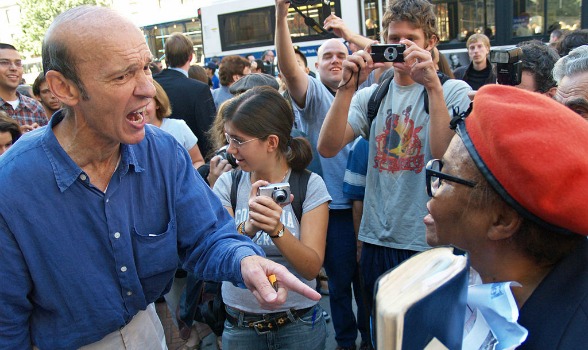(Anger during protest. Source: WikiMedia Commons)
How does understanding culture and power impact your teaching?
A understanding of culture and power greatly impacts my teaching. The biggest way it impacts my teaching is by ensuring that I critically look at myself and the way that I communicate with children, parents and the community. It is also about knowing to listen and honor each of my students experiences. An understanding of culture and power means recognizing that everybody has a unique culture that extends beyond ethnicity; while being aware of the existing white dominance and privilege. For that reason, it is all the more important that I get to know and understand each of my students; and that I believe in each student’s endless potential.
Pick three terms that resonate with you from the Multicultural Education word wall. Define the terms and discuss why you chose these three terms.
I chose these three terms because these are the terms that I regrettably know the least about, and one of the most important things that I have learned about being a teacher, is to always look for ways to expand my knowledge.
Fragmentation: At the most basic level, it seems that fragmentation is the breaking down of the traditional senses of a culture. In the education system, fragmentation could be caused by a lack of a connection between a certain group of students and the school system. This lack of connection, or gap may cause poor interrelationships amongst the school and parents. At its core fragmentation is about structural equality, in that systems provide something for one group of people that they do not provide for another.
White Fragility: White fragility is about a state in which white people may reach when faced with even a small amount of racial stress. White fragility may include acting defensive, angry, full of guilt or other actions including, leaving the conversation in a high stress situation or causing an argument.
Meritocracy: Boy am I ever glad that I looked into this word. Because it is something that I feel very passionate against. Meritocracy means that in society those with natural (or predisposed) ability are rewarded.
Describe your plan to teach in a culturally responsive way in the coming year. Include teaching strategies you might employ as well as content/units you will implement.
It is necessary that acknowledge and understand my own cultural values, so that I may understand how it impacts my teaching practices. It is so important that I recognize my cultural identity and then reflect on how I can go about reaching and valuing each and every child. A teaching strategy that is so important to me is bringing my students’ stories and words into my personal preparation, lesson planning and curriculum. This is only possibly by building lasting relationships with all my students and creating environments where students feel safe enough to indulge in taking risks and making mistakes in order to build richer and deeper understandings.

For most of my life I have been risk-adverse. As a young man, maybe even from elementary school, rarely have I felt confident enough to any kind of a risk. I always wanted to play it safe. I was dull. I wanted to make friends. As I got older, I wanted girls to like me. In high school I wanted to be a part of the cool crowd. If you look at my Facebook page, I posted a photo of myself with my three closest friends in high school, taken at our senior prom. I’m the standout brown face. They were all cool, into cars, had girlfriends, and were the life of the parties. I became their best friend, almost a sidekick to each of them, because I didn’t feel safe in my own identity. I hated myself and being Native. In fact, I generally avoided talking to other Native kids. I didn’t know I had a cultural identity. More than once over the years I heard, “Jerry, you’re the whitest person I know.” I fell into a kind of trap that for decades kept me from reconciling with my Native heritage. At 46, I feel like I’m half dead. I probably am, but at least I’m finally coming to terms with my cultural identity.
None of my high school teachers saw how I was hurting. None reached out to me. I’m still learning, and still refining my own cultural identity. My ethnicity is Native. My culture is something else? It’s going to be a long process of continual introspection and self-discovery for me, but I definitely want my teaching practices to exemplify empathy. I don’t want to leave any of my students feeling like I felt.
Once again, I am blown away by your response Jerry. It means so much to me that you take the time to tell your story and share your experiences. When you talked about your teachers not noticing the hurt, it almost brings me to tears, because I know from experience that there are so many students putting on a strong face when they are hurting on the inside. You have so much to offer your colleagues and students…don’t ever forget it!!